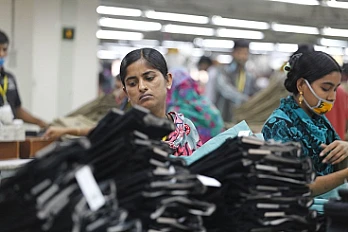Harry Wood | 17 December 2024
Unions claim 9 per cent wage hike is insufficient

Harry Wood | 17 December 2024

AMSTERDAM - Labour unions in Bangladesh have criticised the government’s announcement of an additional 4 per cent pay increase for ready-made garment (RMG) workers, calling it inadequate in the face of rising inflation and the cost-of-living crisis. The increase, set to take effect in December 2024, will be combined with the previously announced 5 per cent annual increment, bringing the total annual wage rise to 9 per cent.
Unions argue that the hike falls far short of addressing workers’ economic hardships. Nazma Akter, an executive committee member of IndustriALL and president of the Sommilito Garments Sramik Federation, condemned the decision. “With inflation hovering above 11 per cent, the additional annual increment of 4 per cent is a pittance,” Akter said. “RMG workers are unable to survive given no real wage growth and the rising cost of living. We urge the government to set up a new minimum wage board as soon as possible and revise wages to meet workers’ needs, ensuring they are paid living wages and not starvation wages.”
The current minimum wage was last revised in November 2023 when the government raised entry-level wages for garment workers from BDT 8,000 (US$66) to BDT 12,500 (US$104). At the time, unions, including affiliates of IndustriALL, demanded a minimum wage of BDT 23,000 (US$190) with a 10 per cent annual increment. However, the final decision aligned more closely with proposals from factory owners, triggering mass protests in Dhaka. The demonstrations were met with violent police crackdowns, resulting in worker deaths and criminal cases against union leaders.
Unions, backed by IndustriALL, continue to push for systemic reforms to improve wages and working conditions in the garment sector. IndustriALL is advocating for legally binding sectoral negotiations through the Action, Collaboration, Transformation (ACT) initiative, which includes dialogue between employers, unions, and global buyers. The initiative aims to establish collective bargaining agreements supported by fair purchasing practices from international brands.
Atle Høie, general secretary of IndustriALL, said: “We believe there is a need to build a comprehensive framework that allows for collective bargaining at the industry level to improve working conditions and wages. This is a unique time for workers and employers in Bangladesh to establish a better and fairer RMG industry, and we invite employers’ associations to collaborate with us to achieve this goal.”
Unions maintain that without substantial wage growth, garment workers will continue to struggle under mounting economic pressures.